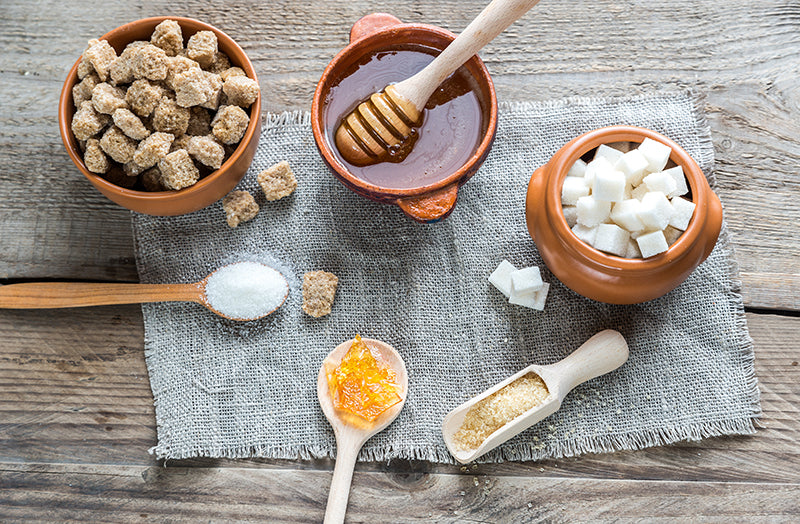You hear a sweet voice in your head, calling you towards the snack machine or the fridge, urging you to indulge in a sugary treat. Sound familiar? You aren’t alone.
Sugar addiction is on the rise in North America and the impact it has on our health is anything but sweet.
The Bitter Truth about Sugar and Health
Sugar is an important biochemical that is involved in numerous processes in our bodies. We need some sugar for survival (glucose is the main energy source for the brain). However, our bodies are not equipped to handle the large quantity and poor quality of sugar that we currently ingest.
You may also be suffering from sugar-related illness and not realize it. Symptoms associated with sugar addiction include:
- Allergies
- Anxiety
- Boils
- Cancer
- Cancer
- Chronic bronchitis
- Constipation
- Depression
- Diabetes
- Fatigue
- Frequent Colds and/or flu
- Gas and/or bloating
- Headaches
- Hyperactivity
- Immune suppression
- Metabolic syndrome
- Mood swings
- Obesity
- PMS
- Sugar cravings
- Tooth decay
- Yeast infections
Today, I’m here to share with you my top five natural sweeteners and sugar substitutes that are much easier for your body to digest and process, and they bring the most health benefits to your body.
So whether you’re looking for sugar substitutes for baking or cooking, or just something to add in your morning tea or smoothie, these are the best five natural sweeteners you can use.
Top 5 Sugar Substitutes
1. Raw Honey
To start with, my No. 1 natural sweetener is pure, raw honey. You really want to make sure it says raw on the label — because that’s the healthiest kind. Ideally, purchase it from a local source.
One of the reasons it’s so beneficial is that honey is not just a sugar — it’s actually a food. In addition to sugar, honey also contains amino acids, specific types of electrolytes and antioxidants, and antimicrobial compounds that can really support the health of your body. So one of your best options when it comes to sugar substitutes is to use pure, raw honey.
Now, you want to use it sparingly. You don’t want to go overboard with using these sweeteners. One tablespoon, one to two times daily, is a good, healthy amount that most people can do well with.
Raw honey is used by many cultures as a remedy for many health ailments including ulcers, digestion problems, and even seasonal allergies. Studies have shown raw honey to have antibiotic, antibacterial, and antimicrobial properties. Many people use honey topically on cuts and scrapes to help fight infection. (1)
With antioxidants, minerals, vitamins, amino acids, enzymes, carbohydrates, and phytonutrients, raw, unprocessed honey is considered a superfood by many alternative health care practitioners and a remedy for many health ailments. Choose your honey wisely. There is nothing beneficial about processed honey
One of my favourite ways to use honey is in the morning with my sprouted, soaked oatmeal. Sometimes I’ll put it in a breakfast smoothie, and I’ll use it when I’m making gluten-free pancakes or use it with some green tea — just a little bit of honey in there to sweeten it up. Honey is probably my most used sweetener that I utilize on a regular basis.
2. Stevia
The No. 2 sweetener you should really consider using on a regular basis — and this is especially good if you have blood sugar issues, if you’re overweight or if you have diabetes — is stevia. Stevia is a no-calorie, all-natural sweetener that comes from the leaf of a flowering plant and is 300 times sweeter than sugar.
There are many types of stevia. Ideally, you should get full, green leaf stevia. Another form of stevia that’s suitable is stevia that’s just ground and part of it is extracted.
There are many brands out there that you should avoid because they’re so highly processed, and they also add in other chemicals. Plus, they come from GMO corn or add in GMO corn derivatives, and we all know we don’t want GMOs in our diets.
Sweet Leaf is one of my favourite brands to use because it’s natural, healthy and delicious. In fact, it even has stevia flavours — you can get chocolate stevia, vanilla stevia, chocolate raspberry stevia and pumpkin pie spice stevia. There are a lot of different brands out there; just make sure you choose the healthiest, most organic type you can find.
The great thing about stevia is there’s no sugar involved at all, making it truly one of the best sugar substitutes around. So if you have diabetes or blood sugar issues, or are looking to lose weight fast, this is a great no-carbohydrate solution.
In fact, a study published in the Journal of Dietary Supplements performed on diabetic rats found stevia improved diabetic symptoms and insulin reactions after 30 days of stevia consumption. (2)
Again, just like using honey sparingly, you shouldn’t dump this in your foods and go overboard. A little bit goes a long way, so use just a few drops in your morning tea or add a little bit to different baking goods.
3. Dates
My No. 3 natural sweetener is dates. We could throw other fruits here into this category — things like raisins, apricots, other dried fruit and pineapple juices — but the great thing about dates is they’re also very high in fiber and potassium, as well as other vitamins and minerals. In fact, of all the sweeteners I’m going to go over, dates nutrition has the highest nutrient value.
Now in terms of phytochemicals that heal the body, honey is the highest, but in terms of actually vitamins and minerals and fiber content dates are the highest. That fiber actually slows down sugar absorption.
So remember, if we’re comparing this to white sugar or high fructose corn syrup, dates are not sugar. Dates are a food that contains sugar, and this food also has fiber and antioxidants, and minerals like potassium, that help you slowly absorb sugar and help regulate sugar within your body.
Dates are good to use in baking especially. They’re great to just throw in smoothies as well, and they’re really great if you’re into raw food and vegan foods. Dates are probably the No. 1 natural sweetener used.
4. Coconut Sugar
No. 4 on my list is coconut sugar. Organic coconut sugar is unrefined, vegan and non-GMO. When you’re baking and you want a recipe that has the equal amounts of one cup of sugar to one cup of an alternative natural sweetener, coconut sugar or coconut palm sugar is the ideal replacement.
Coconut juice, which is where a lot of coconut sugar comes from, is full of potassium, electrolytes and nutrients. So if you’re looking for equal comparison to sugar that’s nontoxic, non-GMO, that your body’s going to be able to digest better, organic coconut palm sugar is a better option.
All of these sweeteners, by the way, are lower on the glycemic index than sugar. Where regular table sugar scores 100, many of these sweeteners score closer to a 50, so half the glycemic index. That means they affect your body in a lesser amount to where they’re not going to cause your energy levels to drop or increase or spike your insulin levels, increasing your risk of diabetes, like a lot of the other sugars out there today.
5. Maple Syrup
Last but not necessarily least in terms of a natural sweetener is 100 percent pure organic maple syrup. Look for grade B or even grade C that is USDA-certified organic.
Maple syrup is one of the best sugar substitutes because it’s a fantastic sweetener. It’s good especially over things like pancakes and waffles and good in certain recipes where you want more of that earthy flavour along with it.
Maple syrup nutrition has so many benefits in addition to simply being one of the healthier sugar substitutes. That’s because maple syrup has a higher antioxidant capacity than sugar. (3) In fact, according to Pharmaceutical Biology, pure maple syrup contains up to 24 different antioxidants. (4) These antioxidants, in the form of phenolic compounds, are beneficial for reducing free radical damage that can cause inflammation and contribute to the formation of various chronic diseases.
Top 5 Sugars to be Mindful of
1. (Refined) Table sugar: FAIL. Not the best option, but with that being said, if you have a choice between some of the artificial nasties and this, pick this every time. But you’re better off still if you pick some of the others listed in this section instead.
2. Sugar in the Raw: FAIL. Pretty much the same as refined table sugar. Sorry. Both table sugar and sugar in the raw undergo the same initial processing steps from sugar cane to their consumable forms, including filtration, evaporation, boiling, and centrifuging. Refined sugar also has more filtering, processing and drying to render it white. The difference in nutrient content between the two different forms is negligible—they both confer basically the same amount of empty calories.
3. Fruit juice concentrate: FAIL. The small amounts of fructose found in fruit are fine for the most part (unless your diet consists primarily of fructose, and then it’s probably an issue). But the larger dose of fructose found in a concentrate is not a healthy alternative to sugar.
4. Sugar alcohols (erythritol, sorbitol, maltitol, xylitol): DECENT. Basically these are any sweetener ending in the suffix -ol. They have very little effect on your blood sugar, because your body can’t break them down—but because of this, when they get to your gut, your gut flora will break them down for you, creating a byproduct of gas. For this reason, I’d suggest eating them sparingly. Some people can tolerate them in small amounts; others, like those sensitive to FODMAPS, cannot tolerate them at all.
5. Agave: FAIL. This natural sweetener was the darling of the nutritional world for awhile, even recommended as an ideal sweetener for diabetics. But don’t be fooled: while table sugar is made of sucrose (equal parts glucose and fructose), agave is 90% fructose. This is a problem for the same reason fruit juice concentrate and corn syrup are a problem: because fructose is not regulated in your body the same way that glucose is, and it goes straight to storage.
Disclaimer
The advice provided in this article is for informational purposes only. It is meant to augment and not replace consultation with a licensed health care provider. Consultation with a Naturopathic Doctor or other primary care provider is recommended for anyone suffering from a health problem.
__________________________________________________________
Dr. Sylvia Santos is a Naturopathic Doctor practicing in Vaughan, Ontario, Canada. She is a passionate about health promotion and encourages her patients and readers to embrace their full health potential. You can follow Dr. Santos on Instagram, Facebook and Twitter or contact her at ssantos@natcanintegrative.com.


